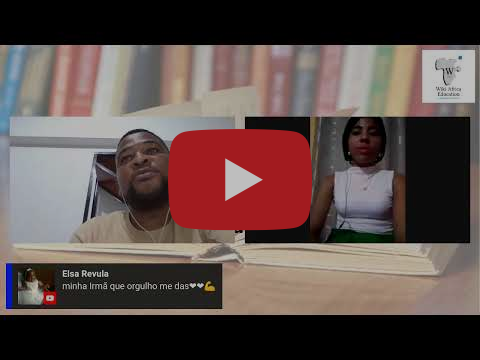Ethale Publishing and Fondazione Aurora are again bringing together young Emakhuwa speakers to drive the growth of the Mozambican language on Wikipedia. This time the core content will focus on 30 inspiring contemporary and historical figures in Mozambique – a symbolic nod to the 30th anniversary of the Rome General Peace Accord.
The digital event on October 7th and 8th 2022 will bring together 30 Emakhuwa-language speakers to celebrate some of the key figures in Mozambique’s history. From an Olympic gold medallist, to award-winning writers, artists, scientists, medics and activists, the latest in the AfroCuration Mozambique series aims to bolster the recently-minted Emakhuwa section on Wikipedia and continue to inspire Mozambican youth.
The target of 30 articles and the theme of ‘Inspiring Figures’ was chosen to coincide with the commemoration of the 30th anniversary – on October 4th – of the signing of the Rome General Peace Accord in 1992, the peace treaty that marked the end of the war of destabilisation in Mozambique. The continued quest for peace is particularly important in the context of the ongoing Islamic insurrection in northern Mozambique, which has displaced nearly one million people.
“Multilingualism is the oxygen of culture,” acclaimed Kenyan author Ngugi Wa Thiong’o told Ethale Publishing in 2019. Yet not a single indigenous African language has more than 100,000 articles on Wikipedia.
Emakhuwa – spoken by seven million people – is the largest indigenous language in Mozambique, yet its digital footprint is faint when compared with European languages. At least 74 non-African languages have more than 100,000 articles on Wikipedia, including Latin, a dead language – except for in the Vatican – and Latvian, the language of a nation of three million people. More than 1.16 billion people live in sub-Saharan Africa.
In September 2021, Moleskine Foundation, Fondazione Aurora and Ethale Publishing held an event with more than 60 participants to launch the world’s largest encyclopaedia – Wikipedia – in the Emakhuwa language. The impact was instantaneous.
“I used to feel ashamed to speak my language in public places,” says Palmira Albertino Revula, 24, one of 60 participants who took part in the September 2021 inaugural AfroCuration. “Now I know I no longer need to feel stigmatized because of who I am.” Palmira’s thoughts mirror the project’s objectives.

“The project supports the process for local languages to play a fundamental role in intergenerational education and universal social representation in northern Mozambique,” says Marta Sachy, CEO of Fondazione Aurora, the event’s main supporter.
The 300-plus pages created in Emakhuwa since the launch in 2021 have already received more than 10,000 views on Wikipedia. The project was commended by the Wikimedia Foundation as one of the three fastest-growing new-language projects on the continent.
“At the Wikimedia Foundation we imagine a world where all people share in the sum of all knowledge. It’s important to have knowledge shared in all languages. Considering that Africa is a growing continent, increasing efforts in making knowledge available not only in English but many languages including African languages is important as it also helps to preserve languages” says Rudolph Ampofo, Senior Regional Projects Manager, at Wikimedia Foundation. “It is always exciting to see new communities leverage the power of Wikimedia projects to create access to locally grown and relevant knowledge. Their efforts speak to our mission to be an infrastructure of knowledge that enables all people to share knowledge. We are happy to see the Emakhuwa series evolve and look forward to continued growth of the language on Wikipedia,” added Ampofo.
Students, professors, journalists, academics and Emakhuwa-language enthusiasts will again participate in the third ‘Afrocuration’ online via Zoom on October 7th and 8th. The objective is to create a ‘repository of inspiration’, a series of articles about famous contemporary and historical Mozambican figures that can inspire Makhuwa youth to strengthen their knowledge of self and their ability to transcend from knowledge consumers to knowledge producers. The repository will also focus on figures that have inspired peace.
“The project is called ‘Who We Are’ because we hope that Wikipedia in the Emakhuwa language will be a hub for Emakhuwa people to learn about their culture, as well as the culture of global counterparts,” says Jessemusse Cacinda, co-founder at Ethale Publishing.
“This time we are adding thirty more articles as a symbolic gesture on the 30th anniversary of the Rome General Peace Accord” says Ethale Publishing co-founder Alex Macbeth. “The hope is that thousands of Mozambicans will take up the baton and publish many more.”

Can you help us translate this article?
In order for this article to reach as many people as possible we would like your help. Can you translate this article to get the message out?
Start translation